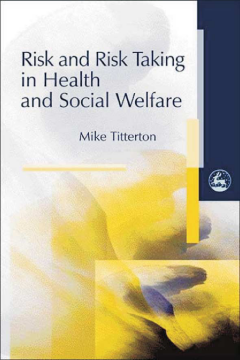
Additional Information
Book Details
Abstract
How can a social worker assess the risk that an older person with dementia faces? How would a nurse or housing support worker decide on the balance between danger and safety? In cases of potentially serious harm, as in the examples of abused children or sex offenders, can risk taking work? In this practical and accessible book, Mike Titterton offers an innovative model of risk work in health and social care. He argues that a thoughtful risk-taking approach can lead to empowerment and greater independence for vulnerable individuals.
The author explores the dilemmas frequently faced when working with older people, homeless persons, and people with physical or learning disabilities or with mental illness, and proposes a systematic framework for assessing and managing the risks involved. He also discusses contemporary theories and definitions of risk, and identifies the essential skills needed by professionals, with an emphasis on developing creative approaches to practice.
Offering a wealth of case studies, examples of good practice and a clear overview of the legislative framework, this book is an invaluable resource for social work, health and housing practitioners, trainers and policy makers.
Mike Titterton is a social work, health and housing trainer and consultant based in Edinburgh, and has worked with the topic of risk as a developmental consultant in health promotion in the UK and internationally. Formerly a lecturer in social policy and social work at the University of Glasgow, he has published widely on health and social care, and edited Caring for People in the Community, also published by Jessica Kingsley.
The author undertakes a thorough literature review, covers a range of topics from asking what is risk and risk-taking, to providing an overview of the pertinent areas of contemporary concern, including a legal perspective. Professional dilemmas are thoughtfully considered and several useful case studies are included, along with helpful signposts to relevant key roles from the social work degree.
Community Care
Clearly presented and offering in addition a wealth of case studies, examples of good practice and a clear overview of the legislative framework, this book is an invaluable resource for social work, health and housing practitioners, trainers and policy makers.
Mental Health
Table of Contents
| Section Title | Page | Action | Price |
|---|---|---|---|
| Summary, including International Threats and Opportunties | |||
| and the International Seed Treaty | |||
| Context | |||
| Some NGO/CSO activities since 1996 | |||
| Maintaining crop diversity | |||
| Conserving domestic animal diversity | |||
| Restoring marine diversity | |||
| Challenging the introduction of GM fish | |||
| Developing agro-ecotourism | |||
| Facilitating farmers' voices in the biotech debate | |||
| Challenging perverse patents | |||
| Protecting farmers' rights | |||
| Contamination of centres of diversity by GMOs | |||
| Monitoring IPR encroachment | |||
| Agenda for Action | |||
| Genetically modified organisms | |||
| Trade | |||
| Intellectual property rights and biopiracy | |||
| Concentration of power | |||
| Genetic resource conservation and development | |||
| Conclusion |
